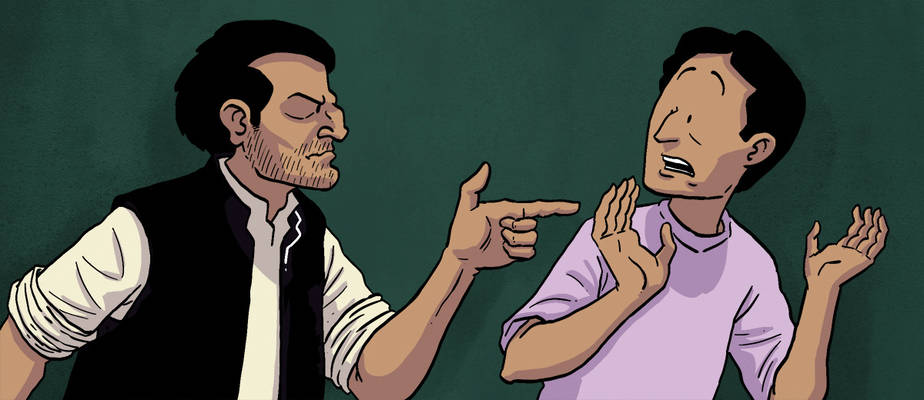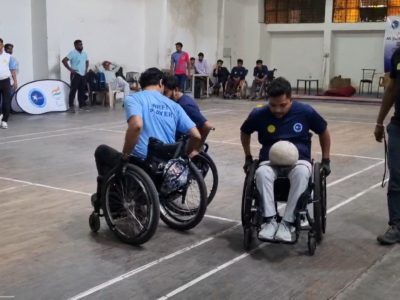Lucknow, A city known for its etiquette, is also the producer of brattish sons of politicians who keep a gun handy in their swanky cars for socialising
“Ma*******, Lucknow se hoon,” said Ashish Pandey, as he prepared to leave the foyer of Hyatt Regency hotel in Delhi. An expression of the sense of fiefdom was almost an afterthought to complete the script. It was preceded with his act of unleashing a torrent of abuses and brandishing a pistol at a couple in the midst of an altercation over his entry to the ladies’ washroom.
In recalling his fiefdom, Ashish was a bit late.
It generally figures early in the order of intimidation, duly followed by official designations or status of those you derive your right to nuisance value from. Ashish is the elder brother of a sitting Bahujan Samaj Party (BSP) MLA in Uttar Pradesh and son of a former Member of Parliament. It would have meant a lot on his turf back home, but there are too many claimants on that kind of political lineage in the national capital. That’s one of the ways to look at the reordering of clout-display protocol he opted for.
Apparently, he has also taken care that his foreign education doesn’t interfere with his ground awareness of power matrix in the country. His real estate and liquor business in Lucknow and Noida, pursuits which need political and muscle support, seem to have guarded him against trappings of academic exposure. The recorded video and media outrage ensured that he was booked. A less clumsy handling on his part would have ensured he wasn’t.
In their fiefdoms, Ashish Pandeys of India, especially of Uttar Pradesh and Bihar, are rarely booked for such offences. It’s a part of negotiations that India has with different forms of entitlement – a claim which is as much of the office-holder or the local strongman as it’s of the family and social extensions which they entail. In this semi-feudal setup, the incumbents of modern state apparatus share their capacity for entitled nuisance with holders of the entrenched local power system.
Has money acted as the neutral equaliser, or say democratising agent, for such claims on social power? Consider, for example, an interesting case in Bihar.
Almost three decades ago, in his study of contemporary Bihar (The Republic of Bihar, Penguin, 1992), Arvind Das had identified the definite difference between what money means, for instance, in Gujarat and Bihar. He had argued that while in Gujarat money had acquired an absolute character in mediating transactions — the monetary strength has predominance over other factors — in Bihar money is just only one of the many social forces.
He analysed the experience of an ordinary action in Bihar, say watching a film or travelling by bus, to drive home the point that it isn’t only money that makes things go round in the state. These mundane public space dealings are complex social exchanges with non-monetary factors of influence, pairvi (recommendations), local status, caste strongholds coming together or in isolation to play important roles.
Giving an account of an average bus travel in Bihar, Das writes:
“Travelling by bus in Bihar is by no means as simple as buying a ticket and boarding a bus. Passengers take their positions (and seats too), not according to the difference in the fare that they paid but according to social status. The seat next to the driver is kept for the saheb, the local notable. The first two seats after that are reserved for the holders of new feudal power, the legislators. After that, the paying public gets a place, ordered according to various indications of social rank (in the mind of the conductor), with the hoi polloi travelling on the roof despite paying full fare. It isn’t unusual for a person who has paid the price of the mythical ticket (which is hardly ever issued) and been given a seat, being made to get up and yield his place to some important luminary who ambles up to the bus at his convenience. The limited meaning of money is drilled home repeatedly in Bihar.”
Three decades later, especially decades of liberalisation when centrality of market and money asserted itself on social conduct, Das’ account might seem an overstated case of even an attempt at exoticising the Bihar experience. Money, as anywhere else, is clearly the driving force of social life in the state. But still, it’s not the sufficient or the only lubricant of social power. A reflection of which could be seen in how popular culture is still mirroring the assertion of social clout in the state. It’s framed in non-monetary terms — invoking caste power (of lower castes as well as that of higher), political clout, etc. In the process, the social capacity for nuisance is seen as a reflection of such power, including the licence for sexual harassment.
In an earlier piece, the author had dwelt on how caste rivalries have spilled over to popular culture. In Bhojpuri pop music scene, the appeal of which is spread over Bihar, eastern Uttar Pradesh and Jharkhand, musical statements of competitive sexual harassment are laced with caste-revealing surnames as arbiters of social clout. From higher caste to lower — from Babu Saheb ka/ Pandeyji ka to Yadavji ka/ Paswanji ka) — there are songs indicating nuisance value of different caste groups.
Ten years before Ashish Pandey could demonstrate it, the popular culture in Hindi heartland had a song celebrating the impunity that comes with something cutting across caste lines: political power. The song was echoing the licence, which even family members and associates of elected leaders flash while treating their constituencies as fiefdoms to harass.
This criminal sense of entitlement that political patronage to crime brings can be felt in this 2008 number. The song opens with these lines: “Kaka hamar vidhayak hawue, na derayeim ho, O double choti wali tohke taang le jayeim ho” (My uncle is an MLA, I fear nothing. O double-braid girl, I will abduct you).
However, that hasn’t meant that criminal audacity for the expression of social power has been limited to the local strongmen or the political class and its benefactors. It has almost grown aspiration as rangbaazi (which has no suitable English equivalent) developed as a cult, almost a way of life.
It roughly translates to being the local point of dominance, even a small-time troublemaker — someone having one’s way by mere presence and, if denied, by force. In regions where crime and dabangai rose as instruments of social power, its attraction as a means of social mobility couldn’t be ruled out. What was even more important was that the rich of these regions had very limited options for capital investment. Crime, seemingly, emerged as an investment and rangdaari (a form of systematic extortion) emerged as an organised monetisation of rangbaazi.
The logic of this industrial use of criminal lumpenisation was simple: if you are in a dominant or intimidating position to demand cash, just do it.
Rangdaari, or for that matter rangbaazi, was empowered by trigger-happy cheap kattas (country-made single shot pistol) as well as more sophisticated ones for those who went up the ladder. Munger, 210 km south-east of Patna, has been home to two-centuries-old legal gun factory but what has really flourished as a cottage industry in the district is the illegal arms factory, from kattas to replicas of international brand products, including Kalashnikovs.
Ashish Pandey might have brandished an expensive pistol, but it’s the humble katta which has become the default choice of the foot soldiers of the threat-game, and deadly ones too. When the latent force of political patronage or social clout can’t force their way, kattas are there to settle the issue. In Pandey’s home state, the saying in Khari Boli is: “Hamara maano to rum chalega, nahi to katta aur bomb chalega.” (If you agree, you will have rum, lest you will see katta and bomb). In Bhojpuri-speaking regions of the state and in Bihar, the lyrics of a popular number go: “Hayeen rangabaaz, iehaan humra kehu kucho naahi boli, chali shamiyana mein aaz tohre chlate goli”(I am the dominant man here, nobody will say anything, today bullets will be fired for you only).
We inhabit a space where filial and patronage terms of power assertion have ensured that nuisance-negotiations come down to a settling question — Tum humko chihnte/ pehchante ho (Do you know who I am?). Its answer lies in the recognition that social power in the country is best measured in terms of entitlement to nuisance value — both the magnitude of it and impunity of it. The sense of the local and private fiefdoms are intrinsic to it. In Lucknow, Ashish Pandey could have simply said: “Hum Pandeyji ka badka bhai hain” (I am Pandeyji’s elder brother).
www.newslaundry.com





